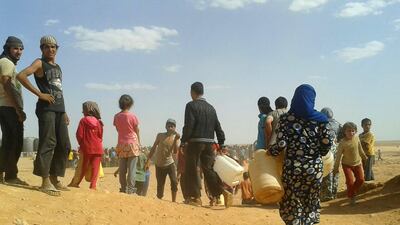Conflict remains the world’s greatest problem and conflict prevention our biggest hope, but if we do not face down crime and uphold justice, we simply risk swapping the challenges. Over the last century, crime has been transformed. Mobsters are more likely to be board members of companies. Safecrackers and getaway drivers have been replaced by worldly accountants and lawyers.
The UN Office on Drugs and Crime’s study of illicit funds showed that the combined proceeds of all crimes amounted to some $2 trillion. If crime were a country, it would fall somewhere between Italy and India in the GDP league. That’s enough money not just to bribe and corrupt the odd customs or law enforcement officer, but to put in one's pocket ministers and ministries in fragile and vulnerable countries. And crime also adores a vacuum.
Ignore crime, concentrate efforts elsewhere, and transnational organised crime is suddenly embedding, spreading and thriving. The most disturbing feature of crime is not just the misery it causes, but its supreme ability to adapt. Let’s also be clear. Just as the hyena trails the lion in the hope of food, crime shadows conflict. It is no coincidence that conflict in Iraq and Syria is helping to drive human trafficking, migrant smuggling and other crimes throughout the Middle East, North Africa and across the Mediterranean. But crime doesn’t just feed off conflict, it fuels it.
____________________
Read more by Yury Fedotov:
Four ways to respond to resurgent Somali piracy
Violent extremism and the challenges it presents
____________________
UNODC estimates that the Taliban raised $150 million, some 50 per cent of their total income, from taxes and their involvement in the illicit opiate trade. Boko Haram is involved in smuggling heroin and cocaine, as well as trafficking people and natural resources across West Africa. Illicit profits are being made in East Africa where the terrorist group Al-Shabaab cooperates with Somali pirates, and earns millions off the charcoal smuggling trade.
These groups are using funds flowing from crime to spread havoc, death and destruction. Their activities undermine nations, weaken the rule of law and hamper development efforts. Ignoring them is perilous and to the detriment of work being done to sustain the lives of people facing poverty and hardship.
But if crime has changed, so have our views on how to confront it. The new transformative 2030 Agenda for Sustainable Development acknowledges the importance of staring down crime as a means of improving lives. Central to these efforts is Goal 16 on peaceful and inclusive societies that contains specific targets on ending crime’s catastrophic impact.
The search for coherence is central to dealing with the world’s woes and it broadly parallels recognition that no country can solve transnational organised crime in isolation. The old view that crime is primarily a national issue has given way to a dependence on greater international cooperation, and a reliance on universal legal instruments such as the UN Convention Against Transnational Organised Crime and the UN Convention Against Corruption.
We, therefore, have the instruments, the alliances and the tools to tackle crime. What might be absent is the willingness to overcome the sequencing question. When should crime be challenged? The time for tackling transnational crime is not a year, or a month or even a day after peace has been agreed. Dealing with crime, strengthening the rule of law and promoting justice cannot wait. All of these need to be delivered simultaneously; if not, problems will develop further down the road.
Perhaps the most recent example of this interlinked approach is to be found in Colombia, where the peace treaty with Farc includes strategies for confronting the country’s cultivation and production of the coca plant. In Colombia, the search for peace, building justice and ending crime are all being dealt with as a single issue warranting holistic solutions. I would suggest this is the way forward everywhere.
Conflicts need to be ended to prevent the suffering of millions and for the good of our shared humanity. But, in the desperate search for peace, let’s not forget the hyena also has a savage bite.
Yury Fedotov is executive director of the UN Office on Drugs and Crime

